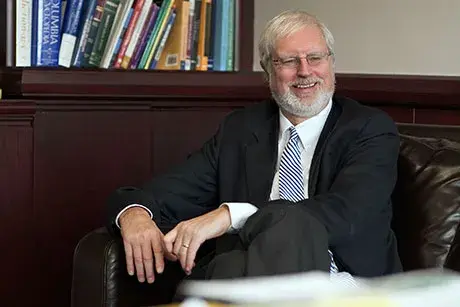Trump: Full Employment for Lawyers
Professor David Logan writes in RWU's 1st Amendment blog that there's at least one thing you can say for Donald Trump’s presidency: He sure keeps lawyers busy.

One thing you can say for Donald Trump’s presidency: He sure keeps lawyers busy.
Within weeks of taking office, he suddenly rolled out immigration rules that banned entrance to travelers from seven predominantly Muslim countries, creating chaos and great anxiety at many airports. But that action was immediately challenged by state attorneys general and held unconstitutional by federal judges. And it brought hundreds of pro bono lawyers to airports across the country to help innocent people caught up in a Kafkaesque regime.
Trump also has been enmeshed in litigation based upon conduct that arose before his election. A judge just gave final approval to a $25-million settlement for people duped into believing Trump University was a bona fide educational opportunity. And litigation arose out of a dispute with a chef at one of his hotels.
Now comes the latest: an incitement to commit violence claim made against candidate Trump arising out of inflammatory comments at a campaign event. You may remember the volatility of many Trump campaign events, with crowds chanting “lock her up” and "Trump that bitch!" and "Build a wall -- kill them all."
Similar anger was apparent at a rally in Louisville in March 2016, as candidate Trump saw protesters in the crowd and repeatedly exhorted his fired-up supporters to “get ‘em out of here.” Three protesters at the rally were then allegedly shoved and punched by Trump supporters. In Nwanguma v. Trump, the protesters seek damages for the manhandling that they experienced, which would constitute assault and battery under Kentucky law, and also damages from Trump for inciting the violence.
Trump's lawyers asserted the First Amendment as a bar to liability, and it is true that the U.S. Supreme Court has made it clear that incendiary speech can only be sanctioned in a narrow range of circumstances. Under the so-called "Brandenberg test," liability is appropriate if the plaintiffs can prove that (1) the statements "explicitly or implicitly encouraged the use of violence or lawless action,” (2) the speaker “intended that his speech would result in the use of violence or lawless action” and (3) that “imminent violence or lawless action is the likely result” of the statements. The trial judge concluded that the protesters provided plausible evidence that satisfied each of these requirements and as a result their claims should not be dismissed.
Of course, it now is up to the lawyers for the protesters to actually prove these elements, and Trump’s lawyers have made it clear that they will zealously defend against the charges. But one thing is for sure: Donald Trump’s speech and conduct, both before and after the election, will be keeping lawyers very busy.
**********
Professor David Logan contributed this piece to RWU's 1st Amendment Blog.
